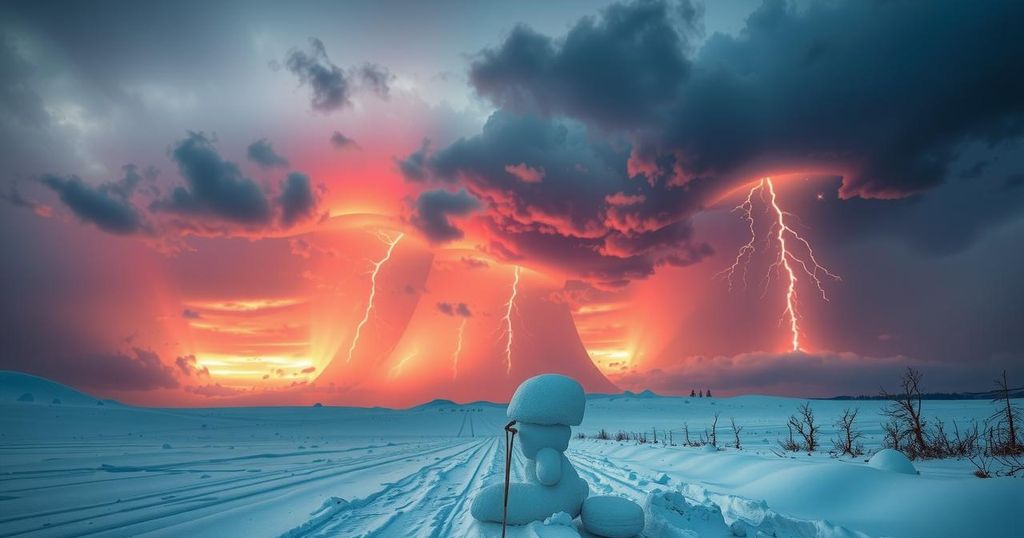The year 2025 has seen intensified weather events, indicated by extreme winds and significant storms, in the context of a record-setting 2024. Advances in climate science now reveal measurable impacts of human-caused climate change on various weather phenomena, influencing everything from heat waves to freezing days. Researchers utilize detection and attribution techniques, providing clarity on climate change’s role in extreme weather, thus altering public perception and scientific discourse.
The year 2025 commenced with a series of extreme weather events, showcasing the intensity of phenomena such as destructive wildfires in Southern California and severe winter storms across the Mid-Atlantic and Southern regions of the United States. These occurrences are juxtaposed with the recent declaration by global meteorological organizations that 2024 was the hottest year recorded in history due to anthropogenic climate change. The evolving discourse reflects a shift in understanding weather extremes and their association with climate change, as scientists continue to uncover correlations through advanced research.
Historically, scientists were hesitant to directly link individual weather events to climate change; however, advancements in climate science over the last decade have improved the ability to assess the influence of climate change on various weather catastrophes, including hurricanes, heat waves, and wildfires. While not every weather anomaly can be directly attributed to climate change, scientists now assert that its effects are detectable in many significant weather patterns. This sentiment is echoed by Justin Mankin, a climate scientist from Dartmouth College, who notes that “the trends in climate are shaping new weather possibilities that were maybe unprecedented.”
To clarify the distinction between climate and weather, Danielle Touma, a climate scientist from the University of Texas, Austin, explains that climate represents the long-term averages of weather patterns—approximately 30 years—whereas specific weather events are akin to choosing an outfit for the day. Despite the variability in daily weather, scientists expect fluctuations to persist as climate change progresses.
The average global temperature has risen by approximately 1.3 degrees Celsius since the 1850s due to an increase in fossil fuel combustion, leading to the trapping of heat within the Earth’s atmosphere. While this gradual rise does not always lead to overt daily weather changes, Deepti Singh, a climate scientist at Washington State University, posits that global warming likely influences weather on a continual basis, albeit subtly. This is evidenced by the reduction in freezing days in several states and the observable increase in heat waves, which have tripled since the 1960s.
The complexities of climate change also give rise to unusual weather phenomena that surpass historical norms, such as the extreme heat wave experienced in the Pacific Northwest in 2021, which was exacerbated by climatic shifts. Alex Hall, a climate scientist from the University of California, Los Angeles, asserts, “we have kind of put the climate on steroids.” This encapsulates the notion that, while the general trends in weather are influenced by climate change, certain extreme events can occur unexpectedly.
Recent methodological advancements in climate science, specifically the detection and attribution techniques, facilitate scientists’ examination of the interplay between human activity and weather patterns. By utilizing climate models that simulate Earth’s atmospheric conditions absent of fossil fuel emissions, researchers can quantify the influence of climate change on specific weather events. For instance, they established that Hurricane Helene’s rainfall was 10% more intense due to climate change and at least 40% more likely to occur as a result of human actions.
Mankin likens this approach to medical clinical trials, indicating how comparative analysis of treatment outcomes can reveal the impacts of various factors. Thus, the science behind attributing climate change to extreme weather events has markedly advanced, allowing for greater clarity in public discourse around these pressing issues.
The article addresses the increasing frequency and intensity of extreme weather events in the context of ongoing climate change. As global temperatures rise due to human activities, such as the combustion of fossil fuels, the link between climate change and weather anomalies has garnered attention from the scientific community. Advances in climate science over the past decade have enabled researchers to discern the effects of climate change on specific weather phenomena, thereby enriching the understanding of climate dynamics and the unpredictability of weather patterns. The commentary offered by leading climate scientists serves to illustrate the changing landscape of climate science as it relates to public awareness and policy.
In summary, the recent fluctuations in extreme weather patterns underscore the profound impact of climate change, as evidenced by correlations established through scientific research. While individual weather events may not always be directly attributable to climate change, the overarching trends reveal a significant alteration in weather dynamics due to global warming. The methodologies developed in the field of climate science have empowered researchers to quantify these effects, leading to enhanced public understanding of the pressing issue of climate change and its implications for weather-related disasters.
Original Source: www.weku.org






